Note
Been a while, but what can you tell me about terms of endearment?
Ia-tocha! Ubese is primarily comprised of verbs, while terms of endearment in most languages are adjectives or nouns. So expressing endearment in Ubese lies mostly in physical gestures. When expressing endearment verbally, one describes affection in terms of actions, usually in the optative mood— for example, "Eis, yateis-etgash" means "May we never be parted." There is also "to love," which is more direct. To say "I love you" is "O, ab-dei." To say, "You are loved" is "adyo," which is preferred for stronger affirmations. It is often repeated for emphasis. "Ei, u-boza" means "You are my home," which is used for people one feels an especially deep bond toward. Ubese terms of endearment can be very creative, and tone is your friend. Ei, uto! Zibo-cha!
5 notes
·
View notes
Note
Ia-tocha! Can you please tell me all you can about Ubese insults?
Ia-tocha! There are many expressions in Ubese which are considered derogatory or otherwise rude.
Yag-b_, as we've covered, refers to someone of impure breeding. Even with the cha suffix, it is considered vulgar (though there's not usually a context in which the cha suffix would be attached to this word anyway.) Bagy_ means to breed improperly, such as with an animal or with a blood relative.
Ishgy_ means to be banished, to be exiled, to be cast out. Banishment from Uba IV is a severe punishment in Ubese law. To use it without the cha suffix strongly implies you are wishing it on someone rather than merely discussing it.
Dizch_ means to make a mistake, to mess up, to do something clumsy. When referring to a small or understandable mistake, the cha suffix is applied. Otherwise, it is used as a rebuke or ridicule.
Chu-d_ is very similar, but more versatile. Its literal meaning is "to cover something in waste." It can refer to a boss ruining a good idea, a person criticizing a holofilm, a toddler destroying a room, or a person making a ruinous and avoidable mistake. Chut_ refers to a person, object or concept that is "covered in waste." Chut_ can describe rude people, malfunctioning droids, bad holofilms, or botched operations.
Ei, uto. Zibo-cha!
3 notes
·
View notes
Note
Ever heard the voicelines from Leia's boushh costume in battlefront 2? Not sure how accurate they are but they seem to be more language than what we get in the movie. https://www.youtube.com/watch?v=KpiHM-8IwpU
Ia-tocha! I have heard those, yes. Those lines are far more phonologically complex than the Ubese this databank deals with, and it's clear there wasn't much thought put into making them linguistically sound. As far as I'm concerned, they're just non-canon sound effects. At most, I'd say it's a different Ubese language from the one we hear in Return of the Jedi. A, uto. Zibo-cha!
youtube
1 note
·
View note
Note
Hi! Do you have anything on how numbers are told in Ubese?
Ia-tocha! In the pinned post, you will see a section entitled Mathematics.
1 note
·
View note
Text
Ubese Word of the Day— YUB

Example Usages
A, yubo-cha. Put a fresh power cell in, would you? (that [topical obj.] to change [2nd p. sg. polite]) lit., Could you change that out?
Yubeit-ga. I'm still the same. (to change [1st p. sg. neg.]) lit., I haven't changed.
Yubat-esh. I hope things change. (to change [3rd p. pl. inanimate optative]) lit., May things change.
Yubaza. This is a power converter. (to change [3rd p. sg. inanimate descriptive]) lit., This component changes things.
2 notes
·
View notes
Text
Ubese Word of the Day— YE-T

Example Usages
A, ye-tocha. Hold this for me, would you? (that [topical obj.] to bring [2nd p. sg. polite]) lit., Would you hold this?
U, ye-totga. Leave him outside. (him [topical sg. obj.] to bring [2nd p. sg. neg.]) lit., Don't bring him.
At, ye-tosh. I hope you bring your famous muffins to the party. (those [topical obj.] to bring [2nd p. sg. optative]) lit., May you bring them.
Is, ye-taza. This is a bag. (these [topical obj.] to carry [3rd p. sg. inanimate descriptive]) lit., This carries things.
2 notes
·
View notes
Text
Ubese Word of the Day— BIDT
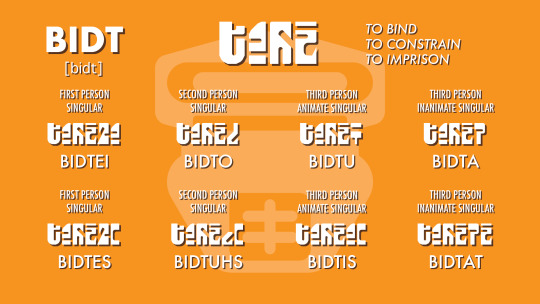
Example Usages
A, bidto-cha. Would you mind wrapping that up for me? (that [topical obj.] to bind [2nd p. sg. polite]) lit., Would you wrap that up?
Ei, bidtot-ga. Unhand me at once! (me [topical obj.] to constrain [2nd p. sg. neg.]) lit., Don't constrain me!
Is, bidtush. I only hope the army can be stopped. (them [topical obj.] to constrain [3rd p. sg. animate optative]) lit., May they be reined in.
Bidtu-za. These are stun cuffs. (to bind [3rd p. sg. descriptive]) lit., These are to bind someone with.
0 notes
Text
Ubese Word of the Day— YAG-B
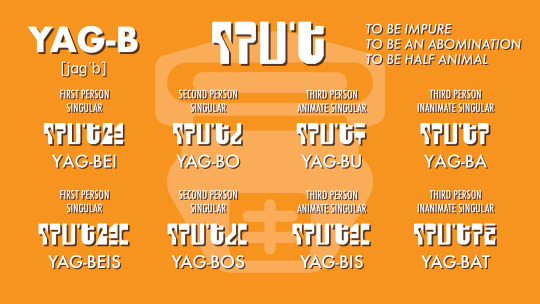
This word is considered vulgar in Ubese. As a term of abuse, it is almost never used in polite contexts.
Example Usages
Yag-bocha. You dirty dog, I almost respect you. (to be half animal [2nd p. sg. polite]) lit., You animal, you.
Yag-beitga! You take that back about my mother! (to be half animal [1st p. sg. neg.]) lit., I am not half animal!
Yag-bosesh. These machines will be more terrible than anyone can imagine. (to be an abomination [2nd p. pl. optative]) lit., May these machines be abominations.
O, yag-bisza. You're a sick pervert. (you [topical obj.] to be half animal [3rd p. pl. animate descriptive]) lit., You create half-breeds.
0 notes
Text
Ubese Word of the Day— U-T

Example Usages
Ei, u-tocha. Could you show me how to do this? (me [topical obj.] to teach [2nd p. sg. polite]) lit., Can you teach me?
U-totga. I know what I'm doing. (to teach [2nd p. sg. neg.]) lit., Do not teach.
U-teish. I hope you can learn from me. (to teach [1st p. sg. optative]) lit., May I teach.
Ei, u-taza. This is my textbook. (me [topical obj.] to teach [3rd p. sg. inanimate descriptive]) lit., This is to teach me.
1 note
·
View note
Text
Ubese Word of the Day— YUZ
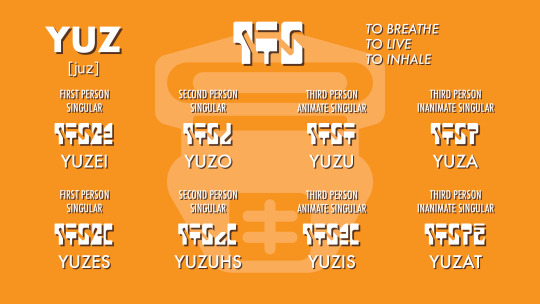
Example Usages
Yuzuhs-cha. Everybody please calm down. (to breathe [2nd p. pl. polite]) lit., All of you please breathe.
Yuzut-ga. I'm afraid he passed away. (to breathe [3rd p. sg. animate neg.]) lit., He is not longer breathing.
Yuzosh. May you thrive here. (to live [2nd p. sg. optative]) lit., May you live.
Yuzei-za. This is my transpirator. (to breathe [1st p. sg. descriptive]) lit., This is so I can breathe.
0 notes
Text
Ubese Word of the Day— YEB

Example Usages
Yebat-cha. Connect those two wires, please. (to connect [3rd p. pl. inanimate]) lit., Connect those, please.
Os, yebeit-ga. I'm separating you until you can learn to get along. (you [pl. topical obj.] to connect [1st p. sg. neg.]) lit., I'm restricting your ability to connect.
Eis, yebush. Let us marry. (us [topical obj.] to bind [3rd p. sg. animate optative]) lit., Let us be joined together.
Yebaza. This is a power coupling. (to join together [3rd p. sg. inanimate descriptive])
1 note
·
View note
Text
Ubese Word of the Day— TU-B
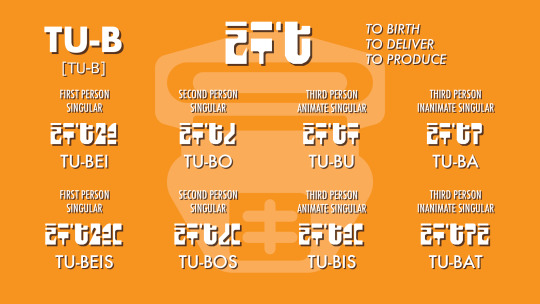
Example Usages
Tu-bocha. For the purpose of this medical evaluation, do you possess a uterus? (to produce [2nd p. sg. polite]) lit., Can you give birth?
Tu-beitga. I'm afraid I had a miscarriage. (to deliver [1st p. sg. neg.]) lit., I did not give birth.
Tu-bosh. May you receive the child you hope for. (to birth [2nd p. sg. optative]) lit., May you give birth.
Tu-bisza. This is a maternity ward. (to birth [3rd p. pl. animate descrptive]) lit., This facility is for giving birth.
0 notes
Text
Ubese Word of the Day— ISHGY
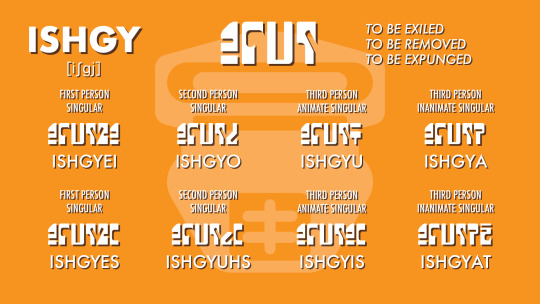
This word is considered vulgar in Ubese as it refers to a sensitive topic. In polite conversation, the cha suffix is used to indicate that the speaker intends no abuse.
Example Usages
Is, ishgyo-cha. You could be banished for saying something like that. [they (topical pl. subj.) to be exiled (2nd p. sg. polite)] lit., They could banish you.
Ishgyeit-ga. You haven't seen the last of of me, dammit! [to be exiled (1st p. sg. neg.)] lit., I will not be banished!
Ishgyush. May he rot in solitude. [to be exiled (3rd p. sg. animate optative)] lit., May he be banished.
A, ishgyei-za. Can't you see I'm being framed, dammit? [this (topical subj.) to be exiled [1st p. sg. descriptive]) lit., This is an excuse to exile me.
0 notes
Text
Ubese Word of the Day— UT

Example Usages
A, uto-cha. Kindly explain the object you are holding. (that [topical obj.] to speak [2nd p. sg. polite]) lit., Tell me about that.
Uteit-ga. Your interrogation efforts will come to nothing. (to speak [1st p. sg. neg.]) I won't talk.
Utat-esh. If these walls could speak... (to speak [3rd p. pl. inanimate optative]) If they spoke.
O, uteiza. I will contact you with this comlink. (you [topical obj.] to speak [1st p. sg. descriptive]) This is so you can speak to me.
1 note
·
View note
Text
Ubese Word of the Day— U-B

Example Usages
Ei, u-bocha. Please let me stay with you for the night. (you [topical obj.] to house [1st p. sg. polite]) lit., Will you house me?
Ei, u-batga. I don't live here. (me [topical obj.] to house [3rd p. sg. inanimate neg.]) lit., This does not house me.
Eis, u-bash. May we find sanctuary here. (us [topical obj.] to house [3rd p. pl. inanimate optative]) lit., May this house us.
U-baza. This is our homeworld. (to act as home [3rd p. sg. inanimate descriptive]) lit., It serves as home.
2 notes
·
View notes
Text
Ubese Word of the Day— TASH

Example Usages
O, tashei-cha. Please listen to what I have to say. (you [topical subj.] to be heard [1st p. sg. polite]) lit., I will be heard by you.
U, tashot-ga. I don't think he can hear you. (them [sg. topical subj.] to be heard [2nd p. sg. neg.]) lit., You are not heard by them.
Is, tashes-esh. May they heed our warning. (them [topical subj.] to be heard [1st p. pl. optative]) lit., May we be heard by them.
Tashei-za. This is my comlink. (to be heard [1st p. sg. descriptive]) lit., This is so I can be heard.
1 note
·
View note
Text
Ubese Word of the Day— TA-D

Example Usages
Ta-deischa. Won't you join me for a swim? (to swim [1st p. pl. polite]) lit., Let us swim.
Ta-deitga. I cannot swim. (to swim [1st p. sg. neg.]) lit., I don't swim.
Ta-dosh. I hope you can swim. (to swim [2nd p. sg. optative]) lit., May you swim.
A, ta-disza. Welcome to the aquarium. (that [topical obj.] to swim [3rd p. pl. animate descriptive]) lit., This is where the fish swim.
1 note
·
View note